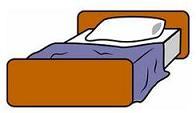
जब मैं घर आऊँगा तब खाऊँगा jab main ghar aaoongaa tab khaaoongaa
- When I come home then (I) will eat (Said by a Male)
जब मैं घर आऊँगा jab main ghar aaoongaa - When I come home, and then just after we’ve said तब खाऊँगा tab khaaoongaa - Then I will eat.
We can drop the मैं main - I, in the second part of the sentence because it refers to the same person from the first part of the sentence. We usually drop the ‘then’ in English too and simply say ‘When I come home I will eat’, but in Hindi we always have to use तब tab! Are you with me? Ready to see another example?

जब मैं आपको किताब दूँगी तब इसको पढ़िए jab main aapko kitaab doongee tab isko parhie
- When I give you the book (then) please read it (Said by a Female)
This time we’ve used an Imperative - पढ़िए parhie - Please read, in the second part of the sentence; we’re saying when I give you the book then read it. These sentences are a little tricky, so be sure to read them through many times to make sure you understand them. Don’t forget you can always ask me questions in the comments section below! So let’s carry on…

जब राम बोलता है तब हम सुनते हैं jab raam boltaa hai tab ham sunte hain
- When Ram speaks (then) we listen
This time we’ve used the Present Tense to show it’s a habitual action, it happens all the time. Every time Ram speaks we always listen! Are you starting to get the idea of this? Let’s see a few final examples…

जब वह ऊपर जाएगी तब मैं सो जाऊँगा jab voh oopar jaaegee tab main so jaaongaa
- When she goes upstairs (then) I will go to sleep

जब हम कहेंगे तब दौड़ो jab ham kahenge tab dauro
- When we say, run!

जब रोशन बगीचे में बैठ जाता है तब कहानियाँ लिखता है jab roshan bageece men baith jaataa hai tab kahaaniyaan likhtaa hai
- When Roshan sits down in the garden (then he) writes stories
So do you get the idea now? These sentences are all quite straight forward, the only new part is using our new words जब jab - When and तब tab - Then!
But here’s a tricky part! We’ve already seen a word for When in Hindi - कब kab but it is completely different to जब jab - when! So what’s the difference? Well it’s easy, कब kab is used for a question and जब jab is used for a statement! Have a look at the following two sentences…
- आप कब जाएँगे? aap kab jaaenge - When will you go?
- जब आप जाएँगे तब मैं भी जाऊँगा jab aap jaaenge tab main bhee jaaoongaa - When you go I will too
Phew! Sorry for such a long lesson. Have you got any questions? If so then please feel free to leave them in the comments section just below and, as always, I’ll do my best to help. Hopefully you now understand how to use जब jab and तब tab! Try and practice and make some of you own ‘When… Then’ Hindi sentences
No comments:
Post a Comment